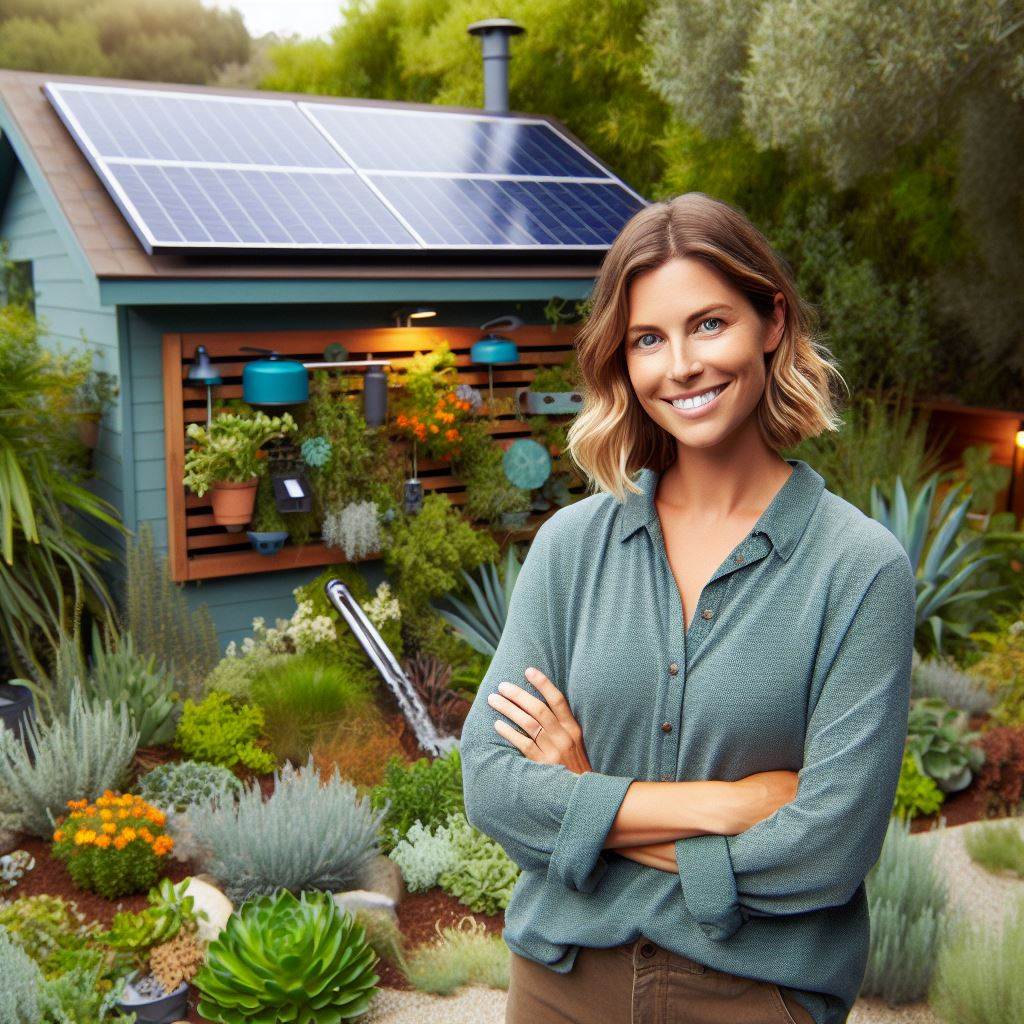Introduction
Water efficiency in modern homes is crucial for sustainable living.
With increasing water scarcity and environmental concerns, it is essential to adopt water-efficient solutions.
In the United States, households consume a significant amount of water, putting pressure on freshwater sources.
According to statistics, the average American uses about 100 gallons of water per day.
This excessive consumption is unsustainable and demands immediate action.
To address this issue, water-efficient solutions should be implemented in modern homes.
These solutions aim to reduce water usage without compromising comfort or convenience.
For instance, installing low-flow fixtures such as faucets, showerheads, and toilets can significantly decrease water consumption.
Additionally, using water-efficient appliances like dishwashers and washing machines can make a considerable difference.
Apart from conserving water, these solutions also offer financial benefits to homeowners.
By reducing water consumption, households can save on utility bills, contributing to long-term cost savings.
Moreover, using water-efficient technologies aligns with sustainable practices, promoting environmental stewardship.
In essence, water efficiency in modern homes plays a vital role in addressing the global water crisis.
By adopting water-efficient solutions, we can ensure the sustainable use of this precious resource.
From reducing daily water usage to saving money on utility bills, water efficiency offers numerous benefits.
It is crucial for homeowners to prioritize water efficiency and contribute to a more sustainable future.
Let’s take action now and make water-efficient choices for a better tomorrow.
The Importance of Water Efficiency
Environmental impact of excessive water consumption
Excessive water consumption has a significant negative impact on the environment.
It leads to the depletion of water sources, causing water scarcity in many areas.
The overuse of water also leads to increased energy consumption for water treatment and supply.
Wastewater discharge pollutes natural ecosystems, harming aquatic life and biodiversity.
By reducing water usage, we can minimize the environmental degradation caused by excessive water consumption.
Financial benefits of reducing water usage
Another important aspect of water efficiency is the financial benefit it provides.
Conserving water translates into lower water bills for households and businesses.
Reducing water consumption also means lower costs for water treatment and infrastructure maintenance.
By adopting water-efficient practices, individuals and organizations can save money and improve their financial stability.
How water scarcity can be a global issue
Water scarcity is not just a local problem; it has global implications as well.
Numerous regions around the world already face severe water scarcity conditions.
Lack of access to clean water affects sanitation, hygiene, and overall health in developing countries.
Water scarcity also contributes to conflicts over water resources between nations.
By promoting water efficiency, we can contribute to the global effort in addressing water scarcity.
Implementing water-saving technologies in modern homes is crucial to achieving water efficiency.
Low-flow fixtures and appliances reduce water consumption without compromising functionality.
Rainwater harvesting systems can be installed to collect and reuse rainwater for various purposes.
Greywater systems enable the reuse of wastewater for non-potable uses like irrigation.
Smart irrigation systems can detect soil moisture levels and adjust watering schedules accordingly.
Insulating water pipes reduces heat loss, saving energy and water in the process.
Education and awareness play a vital role in promoting water efficiency in modern homes.
Individuals must understand the impact of their water consumption habits and take responsible actions.
Governments should implement policies and regulations that encourage water efficiency practices.
Water utilities can offer incentives and educational programs to promote water-saving behaviors.
Collaboration between stakeholders, such as homeowners, businesses, and water authorities, is essential in achieving widespread water efficiency.
In essence, water efficiency in modern homes is of utmost importance.
It helps mitigate the environmental impact of excessive water consumption, brings financial benefits, and addresses global water scarcity issues.
By implementing water-saving technologies, promoting education, and fostering collaboration, we can build a more sustainable future with efficient water usage.
Read: LEED Certification: A Deep Dive
Innovative Water-Saving Technologies
Water efficiency is not only important for the environment but also for reducing utility bills in modern homes.
With the advancement of technology, various innovative water-saving technologies have emerged, making it easier for homeowners to conserve water.
In this section, we will explore three such technologies that are revolutionizing water efficiency.
Smart Irrigation Systems
Smart irrigation systems are designed to provide optimum water usage for maintaining healthy lawns and gardens.
They use weather data, soil moisture sensors, and advanced algorithms to adjust watering schedules automatically.
By accurately determining the water requirements of plants, smart irrigation systems eliminate the wastage of water that occurs with conventional irrigation methods.
One of the significant advantages of smart irrigation systems is their convenience.
Homeowners can control and monitor their irrigation systems remotely through smartphone apps.
This means that even when they are away from home, they can ensure that their landscapes are getting the right amount of water, reducing the risk of over or under-watering.
Low-Flow Toilets and Faucets
Traditional toilets and faucets consume a significant amount of water, contributing to unnecessary water wastage.
Low-flow toilets and faucets are innovative fixtures designed to reduce water consumption without compromising performance.
Low-flow toilets utilize advanced flushing technologies to effectively remove waste using less water.
Some models offer dual-flush options, allowing users to choose between a full flush and a partial flush based on their needs.
This flexibility can result in substantial water savings over time.
Similarly, low-flow faucets are equipped with aerators that limit the flow of water without compromising on water pressure.
These faucets can reduce water usage by up to 30% compared to traditional faucets.
Rainwater Harvesting Systems
Rainwater harvesting systems have gained popularity in recent years as an effective means of conserving water.
These systems collect rainwater from rooftops and other surfaces, storing it for later use in various household activities such as watering plants, washing cars, and flushing toilets.
There are two primary types of rainwater harvesting systems: direct and indirect.
Direct systems collect rainwater in storage tanks, while indirect systems channel rainwater into the ground through soakaways or infiltration trenches.
Both systems help reduce the demand for potable water and promote self-sufficiency.
In addition to reducing water bills, rainwater harvesting systems offer environmental benefits.
They help prevent stormwater runoff, which can carry pollutants into water bodies, and minimize the strain on municipal water supplies.
In fact, innovative water-saving technologies are revolutionizing water efficiency in modern homes.
Smart irrigation systems, low-flow toilets and faucets, and rainwater harvesting systems are just a few examples of the solutions available today.
By incorporating these technologies, homeowners can play an active role in conserving water and preserving the planet’s most precious resource.
Read: Smart Homes for Sustainability
Green Landscaping Techniques
Xeriscaping and Its Significance in Water Conservation
Xeriscaping is a landscaping approach that focuses on using drought-tolerant plants and minimizing water usage.
It significantly reduces water consumption and promotes sustainable landscaping practices.
Use of Native Plants and Adaptive Landscaping
Native plants are adapted to the local climate and require less water.
Using them in landscaping helps conserve water by reducing the need for excessive irrigation and additional resources.
Tips on Proper Lawn Maintenance to Minimize Water Usage
- Water deeply and infrequently: Instead of frequent shallow watering, water your lawn deeply but less often.
This encourages deep root growth, making the grass more resilient to drought. - Mow your lawn at the appropriate height: Adjust your lawnmower to cut the grass at a higher setting.
Taller grass shades the soil, reducing evaporation and improving water retention. - Leave grass clippings on the lawn: Instead of bagging your grass clippings, leave them on the lawn.
They act as natural mulch, retaining moisture and providing nutrients to the soil. - Aerate your lawn: Regularly aerate your lawn to reduce soil compaction.
This allows water to penetrate deeper, minimizing runoff and increasing water absorption. - Consider replacing traditional grass with drought-resistant alternatives: Explore alternatives like clover or micro clover that require less water and maintenance.
They can provide a beautiful and environmentally friendly lawn.
Read: Eco Materials: Real Estate’s Future

Implementing Water-Efficient Practices in Homes
Significance of Education and Awareness for Homeowners
- Educating homeowners about water efficiency is crucial in promoting sustainable practices.
- By raising awareness, homeowners can understand the impact of their water consumption on the environment.
- Education can empower homeowners to take proactive steps in conserving water and protecting natural resources.
- Awareness about the importance of water efficiency can also lead to cost savings for homeowners.
Practical Tips for Reducing Water Consumption in Daily Activities
- Turn off the faucet while brushing teeth or scrubbing dishes to avoid unnecessary water wastage.
- Fix leaky faucets or pipes promptly to prevent water loss and reduce water bills.
- Take shorter showers and install water-saving showerheads to minimize water usage.
- Only run the dishwasher and washing machine with full loads to maximize water efficiency.
- Capture rainwater for outdoor watering tasks, such as gardening or washing cars.
- Use a broom rather than a hose to clean outdoor surfaces like driveways and patios.
- Reuse water, such as water from rinsing fruits and vegetables, to water indoor plants.
Advice on Selecting Water-Efficient Appliances and Fixtures
- When purchasing appliances, opt for models with high water-efficiency ratings, such as Energy Star certified products.
- Consider installing low-flow toilets and faucets to significantly reduce water usage in the bathroom.
- Invest in water-efficient showerheads that provide a satisfying water flow while conserving water.
- Upgrade to a water-saving washing machine that uses less water during each cycle.
- Choose dishwashers with efficient water jets that can clean effectively with less water volume.
- Install rainwater harvesting systems to collect and reuse rainwater for various household purposes.
- Replace old or faulty plumbing fixtures with water-efficient ones to minimize water waste.
Incorporating Water Efficiency into Daily Life
Implementing water-efficient practices in homes is not only beneficial for the environment but also for homeowners’ wallets.
By educating themselves and being mindful of their water consumption, homeowners can make a significant impact.
Small changes in daily activities, such as turning off the faucet when not in use and fixing leaks promptly, can go a long way in reducing water usage.
Additionally, selecting water-efficient appliances and fixtures can help conserve water and lower utility bills.
By incorporating these practices into their lifestyles, homeowners can contribute towards a more sustainable future.
Read: Green Roofs: Are They Worth It?
Government Incentives and Programs
When it comes to water efficiency in modern homes, government bodies play a crucial role by promoting and supporting water conservation initiatives.
Let’s take a closer look at some of the existing programs and incentives homeowners can benefit from.
Government-led Water Conservation Initiatives
The Environmental Protection Agency (EPA) actively promotes water efficiency and offers resources to homeowners.
Many local and state governments have implemented water conservation programs to educate and encourage residents to save water.
The Department of Energy (DOE) provides information on water-saving technologies and best practices.
Through water management districts, the government monitors and regulates water usage to ensure sustainability.
By highlighting these initiatives, the government aims to create awareness and emphasize the importance of preserving water resources.
Rebates and Incentives for Water-Efficient Upgrades
Homeowners can take advantage of various rebates and incentives offered by the government for water-efficient upgrades.
The EPA’s WaterSense program certifies products that meet water efficiency criteria, making them eligible for rebates.
Some local governments offer tax credits or rebates for the installation of water-saving appliances and fixtures.
In certain regions, homeowners can receive financial incentives for replacing old irrigation systems with efficient ones.
These incentives aim to offset the initial cost of water-efficient upgrades, making them more affordable for homeowners and encouraging widespread adoption.
Resources and Links for Further Exploration
Homeowners interested in exploring government incentives and programs can visit the official websites of relevant government bodies.
The EPA’s WaterSense website provides a wealth of information on water-efficient products, rebates, and local programs.
Local utility companies often have resources on water efficiency and may offer specific rebates or programs in partnership with the government.
State and local government websites usually have dedicated sections with information on water conservation initiatives and available incentives.
By directing homeowners to these resources, they can gain a comprehensive understanding of the incentives and programs available in their area.
Government incentives and programs form a crucial part of promoting water efficiency in modern homes.
Through various initiatives, rebates, and resources, the government encourages homeowners to embrace water-saving upgrades and practices.
By taking advantage of these incentives and exploring the available information, homeowners can contribute to a more sustainable future while also enjoying the benefits of reduced water consumption and lower utility bills.
Conclusion
Water efficiency in modern homes is crucial for sustainable living.
We discussed various ways to achieve this, such as installing low-flow fixtures and using water-saving appliances.
Conserving water not only helps the environment but also reduces utility bills.
It is essential for individuals to take action and contribute to water conservation efforts.
By making simple changes in our daily routines, we can make a significant impact on preserving this precious resource for future generations.
Let’s all play our part in protecting our planet’s most valuable asset – water.




